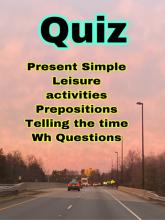- Log in to post comments

Understanding the Present Tense and WH Questions
General Introduction
Mastering the present tense and WH-questions is fundamental for effective communication in English. These grammatical structures not only allow us to describe current actions and habits but also enable us to seek information and clarify understanding in conversations. This article will explore the formation and usage of the present tense, delve into the structure of WH-questions, and provide opportunities for practice through a quiz.
The Present Tense
The present tense is a crucial aspect of English grammar that allows speakers to describe actions and events occurring in the moment. It provides clarity in communication, conveying not only what is happening now but also expressing habits and general truths. Understanding how to correctly use the present tense is essential for effective English communication.
In English, the present tense is typically formed by adding -s or -es to the base form of the verb for third-person singular subjects (he, she, it). For all other subjects (I, you, we, they), the base form of the verb is used. Here are some examples:
- I walk to the store. (present tense, first person singular)
- She talks to her friends on the phone. (present tense, third person singular)
- We eat dinner at 6:00 every night. (present tense, first person plural)
The present tense also describes habits and general truths. For example:
- The sun rises in the east. (present tense, general truth)
- I brush my teeth every morning. (present tense, habit)
In English, the present tense is sometimes referred to as the present simple or present indefinite tense. As the most common verb tense in English, it plays a vital role in everyday conversations.
WH Questions
WH-questions, also known as "information questions," are essential for gathering specific information. They begin with interrogative pronouns such as who, what, when, where, why, and how. These questions help engage in deeper conversations and clarify understanding.
Here are some examples of WH-questions in English:
- Who is coming to the party?
- What do you want to eat?
- When is the meeting scheduled for?
- Where did you go on vacation?
- Why did you do that?
- How did you learn to play the piano?
To form a WH-question, start with the interrogative pronoun, followed by an auxiliary verb (if necessary), and then the subject. The main verb typically comes after the subject:
- Who is coming to the party? (interrogative pronoun + auxiliary verb + subject + main verb)
- What did you eat for breakfast? (interrogative pronoun + auxiliary verb + subject + main verb)
- Where are you going on vacation? (interrogative pronoun + auxiliary verb + subject + main verb)
In WH-questions, the word order is different from normal declarative sentences because the subject and verb are inverted. This inversion is essential for forming correct questions.
Test Your Knowledge
Now that you have learned about the present tense and WH-questions, it's time to test your understanding. This quiz will cover the present simple tense, verbs, leisure activities, prepositions, telling time, and WH-questions. Choose the correct option for each question to assess your knowledge!
Quiz: Understanding the Present Tense and WH Questions
Here is a quiz to test your understanding of the present tense and WH-questions:
---Choose the right option---
- 1. He ______ to the gym every day.
- A) go
- B) goes
- C) gone
- 2. ______ is your favorite color?
- A) What
- B) Where
- C) Why
- 3. They ______ dinner at 7 PM.
- A) eats
- B) eat
- C) eaten
- 4. ______ do you usually wake up?
- A) What
- B) When
- C) Who
More Questions
For additional practice, you can find more questions related to the present tense and WH-questions in the quiz under this article. Testing your skills regularly will help reinforce your understanding and improve your proficiency in English.
Conclusion
Understanding the present tense and WH-questions is essential for effective communication in English. These grammatical structures enable speakers to convey actions occurring now and ask for specific information. By mastering these concepts, learners can enhance their conversational skills and engage more deeply with others.